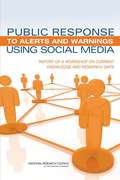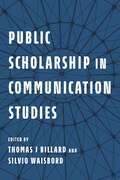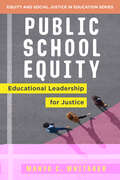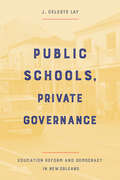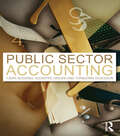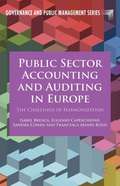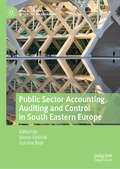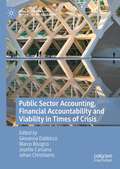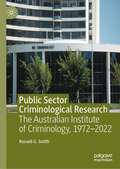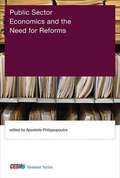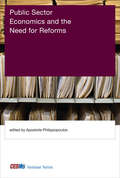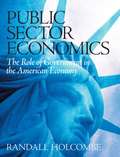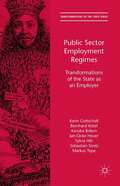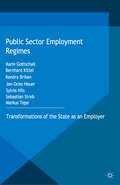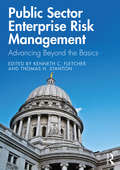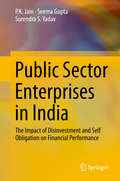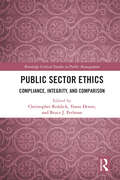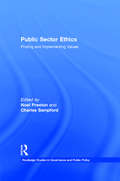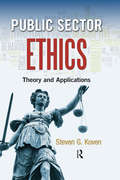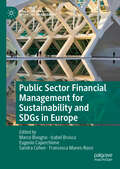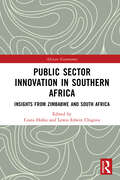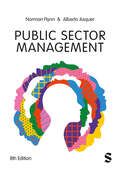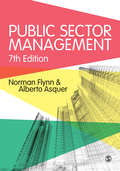- Table View
- List View
Public Response to Alerts and Warnings Using Social Media
by National Research Council Computer Science and Telecommunications Board Division on Engineering and Physical Sciences Committee on Public Response to Alerts and Warnings Using Social Media: Current Knowledge and Research GapsFollowing an earlier NRC workshop on public response to alerts and warnings delivered to mobile devices, a related workshop was held on February 28 and 29, 2012 to look at the role of social media in disaster response. This was one of the first workshops convened to look systematically at the use of social media for alerts and warnings--an event that brought together social science researchers, technologists, emergency management professionals, and other experts on how the public and emergency managers use social media in disasters.In addition to exploring how officials monitor social media, as well as the resulting privacy considerations, the workshop focused on such topics as: what is known about how the public responds to alerts and warnings; the implications of what is known about such public responses for the use of social media to provide alerts and warnings to the public; and approaches to enhancing the situational awareness of emergency managers. Public Response to Alerts and Warnings Using Social Media: Report of a Workshop on Current Knowledge and Research Gaps summarizes presentations made by invited speakers, other remarks by workshop participants, and discussions during parallel breakout sessions. It also points to potential topics for future research, as well as possible areas for future research investment, and it describes some of the challenges facing disaster managers who are seeking to incorporate social media into regular practice.
Public Scholarship in Communication Studies
by Larry Gross Silvio Waisbord Chad Raphael Sue Robinson Aymar Jean Christian Holley Wilkin Amy Jordan Susan Mancino Daniel Kreiss Srividya Ramasubramanian Paula Gardner Philip M Napoli Thomas J. Billard Rachel Kuo Yidong Wang Elaine Almeida Stacey L Connaughton Shannon C McGregor Danielle K Brown Todd P Newman Becca BeetsPrometheus brought the gift of enlightenment to humanity and suffered for his benevolence. This collection takes on scholars’ Promethean view of themselves as selfless bringers of light and instead offers a new vision of public scholarship as service to society. Thomas J Billard and Silvio Waisbord curate essays from a wide range of specialties within the study of communication. Aimed at scholars and students alike, the contributors use approaches from critical meditations to case studies to how-to guides as they explore the possibilities of seeing shared knowledge not as a gift to be granted but as an imperative urging readers to address the problems of the world. Throughout the volume, the works show that a pivot to ideas of scholarship as public service is already underway in corners of communication studies across the country. Visionary and provocative, Public Scholarship in Communication Studies proposes a needed reconsideration of knowledge and a roadmap to its integration with community. Contributors: Elaine Almeida, Becca Beets, Thomas J Billard, Danielle K. Brown, Aymar Jean Christian, Stacey L. Connaughton, Paula Gardner, Larry Gross, Amy Jordan, Daniel Kreiss, Rachel Kuo, Susan Mancino, Shannon C. McGregor, Philip M. Napoli, Todd P. Newman, Srividya Ramasubramanian, Chad Raphael, Sue Robinson, Silvio Waisbord, Yidong Wang, and Holley Wilkin
Public School Equity: Educational Leadership for Justice (Equity and Social Justice in Education #0)
by Manya WhitakerEquality is not equity, tolerance is not inclusion, and access is not opportunity. Efforts to address inequities within our schools tend to ignore the underlying beliefs that sustain injustices, and focus instead on short-lived policies and practices. This book takes a different approach to eradicating educational disparities. Drawing on more than forty interviews with teachers, principals, and district leaders, Manya C. Whitaker offers educators guidance for leading a school or district grounded in social justice that centers teachers—not just teaching practices—and that focuses on the belief systems that shape decision-making. The chapters walk educational leaders through a strategic approach to long-term change: from school planning for family and community engagement, to hiring and onboarding teachers, to sustaining equity through multifaceted professional development and equitable evaluation. Concrete “how-to”s are provided throughout, along with reflection questions to help readers apply the content to their context. For any school or district leader intent on addressing the many inequities highlighted by the COVID-19 pandemic, this book is an essential manual.
Public Schools, Private Governance: Education Reform and Democracy in New Orleans
by J. Celeste LayTwo months after Hurricane Katrina, Louisiana took control of nearly all the public schools in New Orleans. Today, all of the city’s public schools are charter schools. Although many analyses mark the beginning of education reform in New Orleans with Katrina, in Public Schools, Private Governance, J. Celeste Layargues that the storm merely accelerated the timeline for reforms that had inched along incrementally over the previous decade. Both before and after Katrina, white reformers purposely excluded Black educators, community members, and parents. Public Schools, Private Governance traces the slow, deliberate dismantling of New Orleans’ public schools, and the processes that have maintained the reforms made in Katrina’s immediate aftermath, showing how Black parents and residents were left without a voice and the officials charged with school governance, most of whom are white, with little accountability. Lay cogently explains how political minorities disrupted systems to create change and keep reforms in place, and the predictable political effects—exclusion, frustration, and resignation—on the part of those most directly affected.
Public Sector Accounting
by Tjerk Budding Giuseppe Grossi Torbjörn TagessonAs change sweeps across the public sector, a huge range of accounting and financial management challenges are created. This textbook analyses the reforms that are being introduced to deal with these challenges and their global impact on the public sector. Readers are provided with an international overview of government accounting, reporting, management control, cost accounting, budgeting and auditing. In explaining how innovative financial management tools are utilized in the public sector, the authors address a number of emerging issues: Harmonization trends in public financial management and International Public Sector Accounting Standards (IPSASs) Financial reporting and consolidated financial statements in the public sector Public sector management accounting and control methods Financial and performance auditing in the public sector This concise and accessible textbook will be core reading for public sector accounting and financial management students and will also be required reading for students of public management and administration more generally. Managers, accountants, consultants and auditors working in the public sector will also find the book a useful reference.
Public Sector Accounting and Auditing in Europe
by Isabel Brusca Eugenio Caperchione Sandra Cohen Francesca Manes RossiThe accounting systems of all levels of government in Europe have undergone substantial changes during the last 20 years, which have not always been communicated outside country boundaries in a timely manner. This book addresses that shortcoming. With contributions by 25 leading researchers, it discusses in detail the governmental accounting status quo in 14 European countries. The book presents in a concise, thorough and comprehensive way the public sector accounting, budgeting and auditing systems at all levels of government, followed by a comparative analysis of the governmental accounting systems discussed. It also sheds light on the challenges that are likely to be faced by European countries as they move towards adopting the European Public Sector Accounting Standards (EPSAS), and offers a valuable reference resource for academics, researchers, students, auditors, public administrators and policy makers.
Public Sector Accounting, Auditing and Control in South Eastern Europe (Public Sector Financial Management)
by Vesna Vašiček Gorana RojeThis book comprehensively presents the current practice and further development paths of public sector accounting, auditing and control systems in 7 South Eastern European countries based on the contributions of highly-respected researchers. Each chapter is a study of the territorial organisation, public sector scope, formulation and execution of central government and local and regional self-government budgets, accounting and financial reporting reforms and practice, audit and other oversight (supervision) in the public sector, and challenges in the further development of public sector accounting and auditing of each country. It also provides insights into the challenges that SEE countries are faced with as they move towards the adoption of accrual accounting and the implementation of IPSAS and/or EPSAS, and offers a valuable reference resource for academics, researchers, students, auditors, public administrators, policy makers and standard setters.
Public Sector Accounting, Financial Accountability and Viability in Times of Crisis (Public Sector Financial Management)
by Josette Caruana Giovanna Dabbicco Marco Bisogno Johan ChristiaensThis book examines the implications of the Covid-19 pandemic for public-sector accounting and finance. It provides a holistic overview of government initiatives to navigate the pandemic, focusing on how government policies and related spending have affected the budgetary process, the disclosure of information and transparency, as well as the importance of accounting technologies and operating systems in times of crisis. The book shows how government economic interventions have been crucial in counteracting the financial consequences of the global pandemic, and emphasizes the importance of accountability. It will appeal to students and scholars of public policy, public administration and finance, as well as policymakers and public managers responsible for public sector financial and budgetary reporting of public administrations.
Public Sector Criminological Research: The Australian Institute of Criminology, 1972–2022
by Russell G. SmithThis book explores the role and development of criminological research in the public sector during the last half-century. It identifies the benefits such research has provided and assesses whether the community has received value for the funds expended. The Australian Institute of Criminology is used as a case study to illustrate the challenges and pressures facing those who have sought to carry out independent crime and justice research in the public sector, to assess what fifty years of work has achieved and to determine whether or not there remains a need for criminologists to be employed by governments. The book is based on extensive archival research, administrative data analysis, interviews with current and previous staff and the perspectives of scholars in comparable institutions globally. It presents new historical information as well as current and future critical perspectives on crime and justice research in a unique Australian government organization.
Public Sector Economics and the Need for Reforms
by Apostolis PhilippopoulosThe public sector has grown substantially in the last fifty years. In the euro area, for example, total government expenditures have been around fifty percent of GDP since the early 2000s, resulting in a growing tax burden or high public debt or both. At the same time, government had intervened in all aspects of economic life, from the provision of public goods and services to product and labor market regulation. Research shows that the effect of government size on economic performance is positive in countries where the public sector is efficient but negative in countries where it is inefficient. In this book, experts from academe and central banking discuss reforms that would make the public sector more efficient and/or more equitable. After a rich review of the public sector reform policy agenda, with particular attention to the role of the public sector and how to improve the provision of public goods and services, the contributors offer theoretically and empirically informed perspectives on some specific policy topics. These include public wage and employment policy, the role of international institutions such as the World Bank in promoting public sector reforms, the optimal mix of tax policy, the measurement of public sector efficiency, and the study of fiscal sustainability. The contributors relate these topics to such deeper issues as individual incentives as well as to policy debates over privatization, and austerity. ContributorsKonstantinos Angelopoulos, Stylianos Asimakopoulos, Danilo Ballanti, Roberto A. De Santis, Roberto Dispotico, George Economides, Pedro Gomes, Gabriella Legrenzi, James Malley, Costas Milas, Ilaria Petrarca, Apostolis Philippopoulos, Francesco Porcelli, Roberto Ricciuti, Lodewijk Smets, Peter Birch Sørensen, Petros Varthalitis, Francesco Vidoli
Public Sector Economics and the Need for Reforms (CESifo Seminar Series)
by Apostolis PhilippopoulosTheoretically and empirically informed studies on the role and efficiency of the public sector, public wage and employment policy, privatization, tax policy, and fiscal sustainability.The public sector has grown substantially in the last fifty years. In the euro area, for example, total government expenditures have been around fifty percent of GDP since the early 2000s, resulting in a growing tax burden or high public debt or both. At the same time, government had intervened in all aspects of economic life, from the provision of public goods and services to product and labor market regulation. Research shows that the effect of government size on economic performance is positive in countries where the public sector is efficient but negative in countries where it is inefficient. In this book, experts from academe and central banking discuss reforms that would make the public sector more efficient and/or more equitable. After a rich review of the public sector reform policy agenda, with particular attention to the role of the public sector and how to improve the provision of public goods and services, the contributors offer theoretically and empirically informed perspectives on some specific policy topics. These include public wage and employment policy, the role of international institutions such as the World Bank in promoting public sector reforms, the optimal mix of tax policy, the measurement of public sector efficiency, and the study of fiscal sustainability. The contributors relate these topics to such deeper issues as individual incentives as well as to policy debates over privatization, and austerity. ContributorsKonstantinos Angelopoulos, Stylianos Asimakopoulos, Danilo Ballanti, Roberto A. De Santis, Roberto Dispotico, George Economides, Pedro Gomes, Gabriella Legrenzi, James Malley, Costas Milas, Ilaria Petrarca, Apostolis Philippopoulos, Francesco Porcelli, Roberto Ricciuti, Lodewijk Smets, Peter Birch Sørensen, Petros Varthalitis, Francesco Vidoli
Public Sector Economics: The Role of Government in the American Economy
by Randall G. HolcombeThis book attempts to integrate the study of the various aspects of public sector economics by viewing all the government's activities as a product of the democratic decision-making process.
Public Sector Employment Regimes: Transformations of the State as an Employer (Transformations of the State)
by Bernhard Kittel Kendra Briken Markus Tepe Karin Gottschall Jan-Ocko Heuer Sylvia Hils Sebastian StrebPublic Sector Employment Regimes.
Public Sector Employment Regimes: Transformations of the State as an Employer (Transformations of the State)
by Bernhard Kittel Kendra Briken Markus Tepe Karin Gottschall Jan-Ocko Heuer Sylvia Hils Sebastian StrebThis book explores the extent to which a transformation of public employment regimes has taken place in four Western countries, and the factors influencing the pathways of reform. It demonstrates how public employment regimes have unravelled in different domains of public service, contesting the idea that the state remains a 'model' employer.
Public Sector Enterprise Risk Management: Advancing Beyond the Basics
by Kenneth C. Fletcher Thomas H. StantonThrough a series of case studies and selected special topics, Public Sector Enterprise Risk Management presents examples from leading Enterprise Risk Management (ERM) programs on overcoming bureaucratic obstacles, developing a positive risk culture, and making ERM a valuable part of day-to-day management. Specifically designed to help government risk managers, with concepts and approaches to help them advance risk management beyond the basics, the book: Provides a balanced mix of concepts, instruction and examples; Addresses topics that go beyond the basics of Enterprise Risk Management (ERM) program design and implementation; Includes insights from leading practitioners and other senior officials. Many government organizations can refer to the growing body of materials that provide examples of ERM processes and procedures. Far fewer reference materials and examples exist to help organizations develop a risk-mature organizational culture that is critical to the long-term success and strategic value that ERM represents to government organizations. Public Sector Enterprise Risk Management begins to fill that void and is intended to help public sector risk managers overcome barriers that inhibit ERM from becoming an active contributor to major decisions that top officials must make.
Public Sector Enterprises in India
by P. K. Jain Seema Gupta Surendra S. YadavThe book examines the various aspects of non-financial central public sector enterprises (PSEs) in India, for a period from 1986-87 to 2010-11. The analysis is based on all the key financial ratios; namely, profitability, efficiency, liquidity, leverage and productivity. Liberalization and globalization have caused competition in India and have lowered the profit margins. At the same time, Indian government has reduced subsidies and budgetary support for PSEs to curtail their own fiscal deficit. Strategic and economic reforms were also introduced in PSEs to make their operations commercially profitable so that they are not dependent on the government to meet their financial requirements on the one hand, and have their own earnings to finance their expansion/modernization requirements as well as their social obligations, on the other. To what extent, the PSEs have succeeded in this objective constitutes one major aspect of the present research work. The other equally important aspect examined is financial performance of the PSEs which have opted for disinvestment and have signed memorandum of understanding (MoU)/ self obligations. The Indian Government has desired the central PSEs to be profitable in their operations in post-liberation era of 1990s. For this purpose, two major instruments, namely, disinvestment and MoUs, were introduced. This book examines, in detail, financial performance of PSEs which had opted for disinvestment and have signed MoU. Based on analysis/ findings and literature on the subject, the book contains some concrete suggestions that would prove extremely helpful to Indian Government to further improve their financial performance.
Public Sector Ethics: Compliance, Integrity, and Comparison (Routledge Critical Studies in Public Management)
by Christopher Reddick Tansu Demir Bruce J. PerlmanPublic Sector Ethics: Compliance, Integrity, and Comparison presents a comprehensive treatment of the subject of ethics in the public sector. What structural elements are necessary and how to create organizations that make ethics their priority are the questions that this edited book addresses. It focuses on ethics management in public organizations and includes national case studies from select low- to middle-income countries.Taken together, the chapters in this book cover the mechanisms, activities, and approaches that public organizations employ in ethics management. These are of utmost importance because the actions of public organizations affect citizens’ lives, liberties, and property, and their ethical character affects citizens’ faith in government. Numerous factors are at play in each instance of ethics management in public organizations, and controlling ethical behavior is difficult. This book suggests that effective ethics management requires a comprehensive approach. Traditional approaches such as ethics codes, policies and legislation, training, incentives, sanctions, monitoring, and compliance reviews are tools to achieve ethical conformity. Yet, they are effective only if leadership, values, and cultural transformation support them. This edited volume is a cohesive treatment of the subject, covering traditional approaches to ethics management, such as monitoring and compliance, and more contemporary approaches, like integrity building through ethical leadership and organizational values, as well as how to skillfully and effectively combine them to change organizational ethical contexts.This book exposes readers to new approaches and emerging issues in public sector ethics, aids in understanding the challenges of creating ethical organizations, and helps to develop a deeper understanding of ethics management in government organizations. It will be of interest to researchers, academics, and advanced students in the fields of business ethics, public administration and management, leadership, and organizational studies.
Public Sector Ethics: Finding and Implementing Values (Routledge Studies in Governance and Public Policy #Vol. 1)
by Charles Sampford Noel Preston C-A BoisThis study, with contributions from both scholars and practitioners, examines the theory and practice of public sector ethics across a broad range of environments.
Public Sector Ethics: Theory and Applications
by Steven G. KovenIn a down-to-earth review of the often-contentious subject of ethics, Public Sector Ethics: Theory and Applications presents personal accounts of individuals who faced moral dilemmas and how they resolved them. It moves the study of ethics away from a box checking exercise of what to do/not to do to a discussion that creates understanding of existe
Public Sector Financial Management for Sustainability and SDGs in Europe (Public Sector Financial Management)
by Isabel Brusca Eugenio Caperchione Sandra Cohen Francesca Manes-Rossi Marco BisognoThis book analyses the implications of sustainability on public financial management in Europe. Public sector entities at national, regional, and municipal levels all have an important role to play in achieving sustainable development, and are developing strategies to reach this goal. These plans are usually guided by the UN's Sustainable Development Goals and involve public financial management systems, which are adapting to the demanding requirements of meeting these challenges. This book investigates how public financial management systems have been influenced by requirements for sustainability in Europe. It assesses multiple aspects linked to public financial management, including budgeting, accounting, reporting, and auditing. It also considers the impact of the SDGs on accounting systems, as well as other issues related to sustainability, such as green budgeting, gender budgeting, and sustainability and environmental reporting. By providing a cross-country comparison, it aims to identify similarities and differences across Europe. The book will appeal to scholars and students of public policy and financial management, as well as those interested in sustainability and the SDGs.
Public Sector Innovation in Southern Africa: Insights from Zimbabwe and South Africa (African Governance)
by Costa Hofisi Lewis Edwin ChigovaThis timely and thought-provoking book argues that public sector innovation ameliorates many societal challenges in Southern Africa, demonstrating how innovative practices are already improving service delivery and addressing governance gaps.Bringing together a diverse range of scholars, this book’s chapters provide insights into the challenges and opportunities shaping innovation in the public sector. The book highlights the emergence of a new public administration paradigm grounded in theory: innovation in public administration. Through theoretical reflections and case studies from Zimbabwe and South Africa, the chapter authors navigate institutional, technological, and socio-political issues undergirding public sector innovation. The contributors provide perspectives on public governance, examining innovations such as policy innovation labs, smart cities, 4IR, e-procurement, and how technology adoption closes the digital divide and affects citizens’ sense of gain. The book further discusses the institutionalisation of innovation and transitioning to innovation for change, concluding by reflecting on public sector innovation in the future of Southern Africa.The insights shared serve as an essential resource for policymakers, researchers (across fields of public administration, political economy, and African studies), and development practitioners committed to reimagining governance and advancing public sector transformation in Southern Africa.
Public Sector Management
by Norman Flynn Alberto AsquerIn an era marked by unprecedented challenges, from the climate crisis to the rise of populism, the ways to manage public sector organisations have dramatically changed. In the eighth edition of this bestselling textbook, Flynn and Asquer offer the definitive introduction to public administration. Now substantially revised and updated throughout, this text reflects the latest approaches, tools and techniques that help governments respond to the multifaceted problems facing societies today and pre-empt those of tomorrow. Recognising the importance of context, Public Sector Managementunderscores that one-size-fits-all management practices are inadequate. Learn how public sector management adapts to changing political climates and societal pressures and be guided through the intricacies of making evidence-based policies while acknowledging the political dynamics that shape them. Updates to the eighth edition include: · A Global Perspective: Explore variations in public sector management shaped by cultural, historical, and institutional contexts, and gain a deep understanding of how governments address challenges in unique ways. · Balancing Theory and Practice: the new edition offers amore detailed and holistic perspective on public sector management by bringing in the latest theoretical insights and real-world public sector management practices. · Adapting to Change and tacking today’s issues: Confront the challenges faced in the age of technology, from artificial intelligence to Big Data; the climate crisis and clean energy transitions; and resulting from the latest geopolitical shifts including workforce migration to the erosion of trust in democracies. · A Call for Contextual Understanding: Learn how factors such as heterogeneity, population, income inequality, and technological access influence public sector management practices. Public Sector Management is essential reading for upper undergraduate and postgraduate students studying public sector management or public administration and is perfect for those studying on a Master of Public Administration programme. Norman Flynn was Director of the Centre for Financial and Management Studies, SOAS, University of London and Programme Director of the MSc in Public Policy and Management. Alberto Asquer is Head of the School of Finance and Management, Programme Director, MSc Public Policy and Management, and Senior Lecturer of Public Policy and Management at SOAS University of London
Public Sector Management
by Norman Flynn Alberto AsquerIn an era marked by unprecedented challenges, from the climate crisis to the rise of populism, the ways to manage public sector organisations have dramatically changed. In the eighth edition of this bestselling textbook, Flynn and Asquer offer the definitive introduction to public administration. Now substantially revised and updated throughout, this text reflects the latest approaches, tools and techniques that help governments respond to the multifaceted problems facing societies today and pre-empt those of tomorrow. Recognising the importance of context, Public Sector Managementunderscores that one-size-fits-all management practices are inadequate. Learn how public sector management adapts to changing political climates and societal pressures and be guided through the intricacies of making evidence-based policies while acknowledging the political dynamics that shape them. Updates to the eighth edition include: · A Global Perspective: Explore variations in public sector management shaped by cultural, historical, and institutional contexts, and gain a deep understanding of how governments address challenges in unique ways. · Balancing Theory and Practice: the new edition offers amore detailed and holistic perspective on public sector management by bringing in the latest theoretical insights and real-world public sector management practices. · Adapting to Change and tacking today’s issues: Confront the challenges faced in the age of technology, from artificial intelligence to Big Data; the climate crisis and clean energy transitions; and resulting from the latest geopolitical shifts including workforce migration to the erosion of trust in democracies. · A Call for Contextual Understanding: Learn how factors such as heterogeneity, population, income inequality, and technological access influence public sector management practices. Public Sector Management is essential reading for upper undergraduate and postgraduate students studying public sector management or public administration and is perfect for those studying on a Master of Public Administration programme. Norman Flynn was Director of the Centre for Financial and Management Studies, SOAS, University of London and Programme Director of the MSc in Public Policy and Management. Alberto Asquer is Head of the School of Finance and Management, Programme Director, MSc Public Policy and Management, and Senior Lecturer of Public Policy and Management at SOAS University of London
Public Sector Management
by Norman Flynn Dr Alberto AsquerThe seventh edition of the bestselling Public Sector Management is a rich and insightful description, analysis and critique of the management of the public sector by the UK government. NEW to the seventh edition: Now set in an international context with comparative global examples throughout Three new chapters covering: strategy and planning in the public sector; transparency, accountability and ethics; and non-profit management, including the role of social enterprise and the voluntary sector Examines the impact of the continuing financial crisis on public spending An updated companion website with tutorial videos, free access to full-text journal articles, policy documents, links to useful websites and social media resources: https://study.sagepub.com/flynn7 Public Sector Management is essential reading for undergraduate and postgraduate students studying public sector management as part of a business, management or politics degree.
Public Sector Management
by Norman Flynn Dr Alberto AsquerThe seventh edition of the bestselling Public Sector Management is a rich and insightful description, analysis and critique of the management of the public sector by the UK government. NEW to the seventh edition: Now set in an international context with comparative global examples throughout Three new chapters covering: strategy and planning in the public sector; transparency, accountability and ethics; and non-profit management, including the role of social enterprise and the voluntary sector Examines the impact of the continuing financial crisis on public spending An updated companion website with tutorial videos, free access to full-text journal articles, policy documents, links to useful websites and social media resources: https://study.sagepub.com/flynn7 Public Sector Management is essential reading for undergraduate and postgraduate students studying public sector management as part of a business, management or politics degree.
